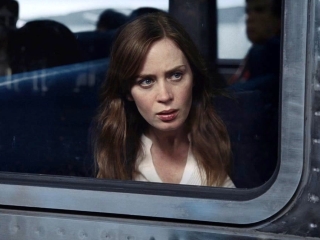Genre: Drama
Directed: Tate Taylor
Stars: Emily Blunt, Haley Bennett, Rebecca Ferguson, Justin Theroux, Luke Evans, Edgar Ramirez, Laura Prepon, Allison Janney, Darren Goldstein, Lisa Kudrow, Rachel Christopher, Lana Young
Production: DreamWorks SKG
I feel the need to defend this film a little bit (not a lot just a little). Story-wise it has the same bemusing melodramatic tone, shifts in perspective and twist-turny moments that set the foundation for Gone Girl's (2014) moody atmospherics. Much like that film, our leads, a triumvirate of Emily Blunt, Haley Bennett and Rebecca Ferguson, do very well as sympathetic characters audiences are willing to hang their coat and hat on for two hours. The editing shuttles back and forth in time, patching in layers of information to give us conclusions where it once was hazy. So what's actually missing here?
 |
| Quite a lot as it turns out. |
The Girl on a Train coyly treads lightly while introducing us to all of the story's moving parts. The seed of suspicion are planted in nearly everyone involved, including our main audience conduit Rachel, who suffers from episodes of blackouts. Even Megan, whom we've come to know as free-spirited and oversexed, gives us the impression that her disappearance is her merely wanting escape. With so many balls in the air, the film is poised to keep us just that much in the dark until plot-points finally chime in.
This is either a sign of a great mystery or a movie hiding the fact that it has little to say. Those suspicions are certainly not helped by Rachel's constant memory lapses which disappear only when the story need them to. Once of course we get into the final act, everything is made clear not by virtue of a collage-like narrative or clever visual foreshadowing but because Rachel suddenly remembers something which holds the key to everything.
As Rachel, Blunt deserves accolades for her portrayal of the ultimate victim in a plot dominated by characters who despise her. Her character arc, (a salvation through fortitude-type conclusion) fails to really gel with the film's machinations. But at least through her, it has the appearance of being earned. There are times I really wished there was more to her; a pulpy anti-hero angle just this side of Ray Milland from The Lost Weekend (1945). Unfortunately because she has to share screen time with the two other main women, not to mention a host of nefarious men, all we get is an alcoholic who'd only get better if she stopped playing into the "crazy ex" cliche.
Thankfully this film is trying to say something more than just "here's a good yarn". There's been a bevy of new "women's films" over the last few years that stretch out of genre comfort zones to tackle worthwhile themes. Themes as current as workplace discrimination (Equity (2016)), body-shaming (Spy (2015)) and misogyny (Mad Max: Fury Road (2015)). While I don't think shining the light on physical and emotional abuse excuses this particular film's many shortcomings; those teetering on whether or not they should see Girl on the Train may see a selling point here.
As far as movie adaptations of mystery novels, written by women, loaded with red herrings, tinged with pop-psychology, brimming with unreliable narrators, jumps in time and an overall cynical view on love, Gone Girl is a much better film. Yet don't count out Girl on the Train simply because it's always painted with the same brush. There's a little something more to this film than it being just a mimic.
Final Grade: C





No comments:
Post a Comment